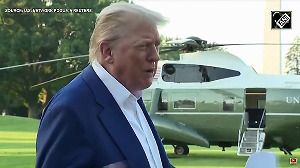Zimbabwe's President Robert Mugabe has pulled his country out of the Commonwealth after members decided to extend the southern African country's suspension over its human rights record.
In its statement in Harare, Mugabe's government demanded that Zimbabwe be fully reinstated. "Anything you agree on Zimbabwe, which is short of this position, no matter how sweetly worded, means Zimbabwe is still a subject of the Commonwealth. This is unacceptable," the statement said. "It's quits, and quits it will be."
In Abuja, Commonwealth officials expressed dismay. "It is not something the Commonwealth wanted," spokesman Joel Kibazo said, calling Zimbabwe's pull-out "disappointing news".
Earlier, Commonwealth leaders meeting in Abuja, Nigeria, agreed to stand by their 18-month suspension of Zimbabwe, reaching agreement in a tense debate that had threatened a split between Western and developing-world members of the organisation.
In a defeat for the Zimbabwean president, Commonwealth heads of state declared Mugabe's suspended status would prevail until he conceded human rights and democratic reforms in his country.
Although the Commonwealth had extended Zimbabwe's suspension, it insisted it had also opened the way for its return.
"This was supposed to be seen as a way forward, not a way backward," Kibazo said adding Commonwealth Secretary-General Don McKinnon was concerned that Zimbabwe does "not isolate itself further" from the international community.
In London, a UK Foreign Office spokesman said, "Mugabe has threatened this many times already. But the Commonwealth reaffirmed the steps that Zimbabwe needed to take to rejoin the Commonwealth and return to the values of democracy and tolerance the Commonwealth was founded on."
It was British Prime Minister Tony Blair who pushed through the deal on Zimbabwe in the face of tough opposition from some African countries. South African President Thabo Mbeki headed the group of those who wanted to keep Zimbabwe inside the Commonwealth fold in the hope persuading the regime to accept reforms.
Blair reportedly delayed his departure from Nigerian capital Abuja in order to win agreement for Zimbabwe's continued suspension. He also urged Commonwealth leaders to disregard Mugabe's threats, saying that there was "no possible justification" for lifting Zimbabwe's suspension imposed last year after the widely-criticised elections, which returned Mugabe to power.
Blair had predicted that if Zimbabwe did pull out it would only be for a limited period. "In the end, they could only speak for the government of Zimbabwe at the moment. I don't think Zimbabwe would ever leave the Commonwealth for any length of time," he said.
Blair's Development Secretary Hilary Benn said in London Zimbabwe's suspension showed the organisation was sticking to its principles. "Zimbabwe has 500 per cent inflation, a high level of unemployment and five-and-a-half million Zimbabweans are short of food. Mugabe's decision is a decision of one man."
"I hope this decision of the Commonwealth will highlight what's going on in Zimbabwe, including the systematic starving of political opponents, ethnic cleansing and the abuse of human rights," shadow foreign secretary Michael Ancram agreed in London.





